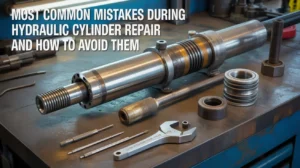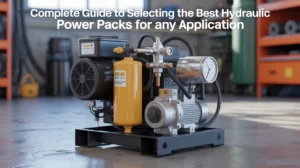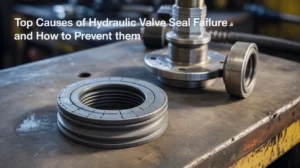Heavy equipment is used in many industries, most notably construction, mining, forestry, and manufacturing. From a bulldozer shearing thousands of pounds of rubble to a forklift moving pallets in a warehouse, the sheer effectiveness of these machines hinges on the hydraulic systems that power and precision them. The hydraulic cylinder piston is a key part of these systems.
The piston is the workhorse that converts hydraulic energy into mechanical motion, and, as such, is often the most overlooked component of a hydraulic cylinder. The entire efficiency, power, and reliability of a heavy-duty machine would come crashing down without it. In this blog, we will discuss the role of the hydraulic cylinder piston, types of hydraulic cylinder pistons, key considerations before purchasing, and how the right piston contributes to improved machine performance.
What is a Hydraulic Cylinder Piston?
The hydraulic cylinder piston is the part moving in the hydraulic cylinder, defined as the centerpiece that separates the two sides of a cylinder and allows for controlled linear movement. It works in conjunction with hydraulic fluid and seals to create the force needed to push, pull, lift, or compress a load.
Essentially, the piston serves as a translator, transforming hydraulic pressure into movement. This right here correlates with the power, longevity, and responsiveness of the machine when used.
How Hydraulic Cylinder Pistons Enhance Heavy Machinery Performance
Power Transmission
Hydraulic pistons go through the process of transforming fluid pressure into a linear force. It enables large vehicles such as bulldozers or cranes to carry heavy loads with minimal effort and as much precision as is needed.
Precision and Control
In other industries where precision is crucial, such as stacking pallets with a forklift or excavating narrow spaces with an excavator, this piston makes movement even, steady, and controlled. More advanced pistons sustain high pressure at high levels in adverse environments.
Durability and Reliability
Good-quality pistons are made from solvent steel or cast iron. It is this level of durability that is needed where heavy machinery is subjected to varying degrees of stress in high-stress environments, such as on rough terrains or in the case of 24/7 operations, where frequent breakdown is not a possibility.
Efficiency in Operations
To minimize leakage, friction, and other causes of energy loss, well-designed pistons are used. This will not only result in less fuel but will also boost the overall efficiency of the machine.
Hydraulic Cylinder Piston Types
So, piston design varies according to different applications. Some common hydraulic cylinder piston types in heavy machinery include the following:
Single-Acting Piston
Works with hydraulic pressure from one side
Used where movement in a single direction is desired (e.g., in jacks, lifts, and presses).
Double-Acting Piston
Functions using pressurized hydraulic fluid in both directions. When you need repeated back-and-forth motion, for example, in excavators, cranes, and other equipment.
Tandem Piston
Two pistons in line to generate more force make it practical for applications that require more load while keeping the cylinder compact.
Telescopic Piston
Four different stages of extension provide long strokes in a short design. Perfect for dump trucks and hoisting equipment. And each one has its purpose, with a piston type being fundamental to the operation of any machinery.
Factors to Consider Before Choosing a Hydraulic Cylinder Piston
If you are looking for a hydraulic cylinder piston for sale, you have to consider the following factors to make sure you get the best performance and value:
Load Capacity: Make sure that the piston will withstand the pressure and weight of your equipment.
First Class Material: Tubes should be made with higher mechanical materials to force out the damage.
Seal Suitability: A good seal reduces fluid leakage that could affect performance.
Environmental Factors: Pistons need to withstand changing temperatures, dirt, and humidity.
Reliability of the Manufacturer: A reliable hydraulic cylinder piston manufacturer has a better guarantee of quality, technical support, and availability of spare parts.
Common Issues with Hydraulic Cylinder Pistons
Hydraulic pistons are built to last, but they can encounter issues with time:
Seal Leakage: Hydraulic fluid seeps out of the machine, thereby lowering efficiency.
Piston Wear: If a piston is constantly under pressure, the surface can become worn.
Corrosion: Piston surfaces are susceptible to damage from exposure to harsh environments.
Too high temperatures: when a high amount of fluid pressure and friction generate excessive heat, failure can occur.
These problems can be substantially reduced by regular inspection, timely replacement, and a wise choice of high-quality pistons.
Cost Considerations: Hydraulic Cylinder Piston Price
Hydraulic Piston price per type/size/application. For example:
- They are cheaper than basic single-acting pistons.
- Double-acting or telescopic pistons are much more expensive (due to a more complex design and higher load capacities).
When it comes to price, keep in mind that high-quality pistons are an investment that saves you money over the life of an engine by preventing repairs and downtime.
Role of Hydraulic Cylinder Piston Manufacturers
The performance of heavy machinery largely depends on the selection of the right hydraulic cylinder piston manufacturers. Reliable manufacturers ensure:
- Consistent product quality
- Precision engineering for compatibility
- Technical support and custom solutions
- Availability of replacement parts
- Against these unfavourable conditions, it safeguards the machinery from failure, protects human life, and reduces running costs.
Why Hydraulic Cylinder Pistons Are Indispensable in Heavy Machinery
- They are what give you the power to lift, dig, push, and pull.
- They provide controlled motion for safe operations and are exiting only when or where desired.
- They directly affect machine performance and life span.
- They assist in energy optimization, and that leads to operational cost savings.
To summarize, we need hydraulic pistons because heavy machinery would not be able to provide the strength and efficiency required by industries today.
Conclusion
The hydraulic cylinder piston is not simply an element, but the core of mechanical power. Whether delivering high-efficiency operations or thousands of horsepower, pistons allow industries to take on heavy-duty jobs with peace of mind.
If you are searching for different types of hydraulic cylinder pistons for sale or leading manufacturers, consider strength, performance, and quality.
For reliable products and a recognized knowledge base, THM Huade became a high-profile name in the hydraulic industry with durable high-flow pistons.
FAQs
Q2. What are the common types of hydraulic cylinder pistons?
The main hydraulic cylinder piston types include single-acting, double-acting, tandem, and telescopic pistons, each designed for specific applications.
Q3. How do I choose the right hydraulic cylinder piston for my machine?
Consider factors like load capacity, material, seal quality, operating environment, and the reputation of hydraulic cylinder piston manufacturers before purchasing.
Q4. Where can I find reliable hydraulic cylinder pistons for sale?
You can source pistons from reputable hydraulic cylinder piston manufacturers or authorized distributors who ensure quality, durability, and after-sales support.



